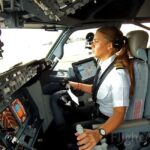The process of gaining the abilities, expertise, and information required to be a licenced private pilot is known as private pilot training. An individual who has been permitted to operate an aircraft for non-commercial uses, such as leisure flying or personal transportation, is known as a private pilot. The Federal Aviation Administration (FAA) in the United States and other regulatory authorities in other nations govern private pilot training.
A commercial pilot licence (CPL) is necessary for a pilot to be able to fly an aircraft for compensation. Therefore, a pilot who has obtained a CPL is qualified to fly an aircraft and be paid for it, whether it be for carrying passengers or cargo or instructing pilots.
A pilot must fulfil a variety of conditions to get a CPL, which usually include amassing a certain amount of flight hours, passing a medical examination, performing well on written and practical tests, and possessing a particular level of education. But before obtaining a CPL, the applicant must first obtain a PPL, or private pilot licence. A pilot must first get a PPL before becoming eligible for a CPL.
Flight training and ground school teaching are often part of private pilot training. The theoretical components of aviation, such as aerodynamics, meteorology, navigation, flight planning, and federal aviation rules, are covered in ground school education. Aspiring pilots can learn how to control an aircraft in a variety of scenarios and conditions through flight training, which is a hands-on learning experience.
Finding a reputable flight school that fits your needs and budget is the first step in the private pilot training process. There are various flying schools to pick from, ranging from modest neighbourhood schools to sizable, prestigious organisations. To locate a school that provides high-quality teaching, knowledgeable teachers, and well-maintained aircraft, it is crucial to investigate the various programmes and read reviews.
As students progress in their training, they will learn more advanced skills, such as flying at night, in adverse weather conditions, and complex airspace. Students will also learn emergency procedures, such as how to handle engine failures, and how to navigate in the event of a loss of communication with air traffic control.
Students must pass a practical flight test after finishing their flight training and passing the FAA written exam. An FAA-approved examiner administers the practical flight test, which consists of both a flight portion and an oral element. The student pilot must show throughout the flight phase that they can safely operate the aircraft and execute a variety of manoeuvres. The examiner will quiz the student on aviation theory and rules during the oral portion.
As they develop in their training, students will master increasingly sophisticated techniques like night flying, flying in bad weather, and flying in complicated airspace. Additionally, students will be taught emergency procedures like how to handle engine failures and navigate if air traffic control is lost.
One thing to remember is that the qualifications criteria for obtaining a private pilot training may differ by nation or regulatory agency.
Advantages of training as a private pilot:
A pleasant and thrilling experience with numerous advantages is learning to fly a private aircraft. This essay will examine the career prospects, travel freedom, and financial savings associated with learning to fly privately.
Improving oneself
Private pilot training necessitates a high level of dedication, restraint, and work. Being a pilot involves developing new skills, overcoming challenges, and stepping outside of your comfort zone. This experience has the potential to be very rewarding and can help you. Develop a sense of self-confidence, self-discipline, and resilience. Private pilot training also calls for exceptional communication and decision-making skills. Which can be useful in both your personal and professional life.
Employment Possibilities
A universe of job prospects may be made available by becoming a private pilot. In sectors including tourism, agriculture, and transportation, private pilots are in high demand. Private pilots can also work for private persons or businesses, performing aerial surveys or offering transportation services. Aside from these job prospects, private pilot training can be a springboard. For other aviation careers like commercial airline pilots or flight instructors.
Journey Freedom
The freedom it grants in terms of travel is one of the biggest advantages of becoming a private pilot. You can fly to places with a private pilot’s licence that is difficult for commercial airlines to reach. Smaller airports, isolated locations, or even your airstrip may fall under this category. You can also fly according to your schedule if you are a private pilot. Which will help you avoid delays and long airport lineups.
Saving money
Even though private pilot training demands a sizable time and financial commitment, it may ultimately save money. Private pilots can fly themselves as well as their passengers. To their desired locations, doing away with the necessity for pricey commercial airline tickets. To further lower the overall cost of travel, private pilots now have the option. Of splitting the cost of flights with customers.
Enhanced Viewpoint
Private piloting offers a special viewpoint on the planet. A new degree of comprehension and love for the earth we call home may. Result from being able to see it from above. Additionally, learning to fly as a private pilot can give you a sense of adventure. And exploration, enabling you to visit new locales and interact with diverse people.
Networking and the Community
Getting your private pilot’s licence also gives you the chance to join a close-knit group of aviation enthusiasts. You can network with other pilots, go to aviation events, and join aviation organisations as a private pilot. This group of people can be a great resource for networking as well as for friendship and support.
Even are several renowned aviation institutions in India that provide top-notch. Instruction and training to students interested in working in the aviation sector.
Conclusion:
To sum up, completing private pilot training is a rewarding and exciting process that. Needs dedication, tenacity, and a passion for aviation. After finishing Private Pilot Training, individuals can get the independence and flexibility to fly for pleasure. Or personal transportation, and others may even choose to pursue professions in aviation. Private pilot training includes several benefits, including the chance for professional growth, financial savings, broadened perspectives. Involvement in the community, and networking. Whether you are interested in flying for personal or business reasons. Private pilot training may be a highly rewarding experience that offers lasting benefits.










